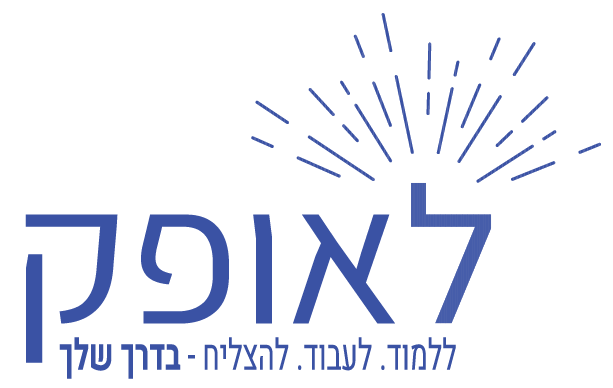La’Ofek’s Shachar Chadash Program was founded with the goal of providing a response to the wave of layoffs wrought by Covid-19. In the short time since its founding, the program has succeeded in assisting many unemployed find work and guide their professional future anew – and the blessed work only continues to expand.
Crises are sometimes opportunities for growth, and that is exactly what became clear to Shlomie (not his real name). When he was 61, he was injured at work and was unable to physically continue in his position. In the background covid was raging which only made it more difficult to find a new job which matched his skills.
Shlomie decided to turn to La’Ofek’s Shachar Chadash Program, whose goal is to assist people suffering from circumstances similar to his return to the workforce. The program coordinator first tried to find Shlomie positions in the retail management field, from which he had arrived, but after a number of personal conversations with one of the organization’s volunteers, it became clear that more than anything, Shlomie became excited when talking about returning to be a mohel – a position in which he worked for 28 years. Together with the volunteer, Shlomie succeeded in gathering recommendations from families for whom he performed a brit, and within a short time he was already invited to perform another brit.
Shlomie’s success story is just one example of many. Every day more and more jobseekers turn to La’Ofek, while simultaneously the volunteers’ desks are piling up with heartwarming thank you letters. This extensive activity is especially surprising in light of the fact that Shachar Chadash was only launched at the end of 2020. The program was founded due to Covid, which brought a wave of layoffs leading to a significant increase in the number of unemployed. Even though nearly two years have passed since the pandemic’s outbreak, there are still quite a few people today who are losing their jobs and are forced to worry about their employment future. Therefore, Shachar Chadash’s managers are not sitting idly, but are rather hoping to succeed in expanding the program’s activity to reach as many unemployed as possible.

Each one and his need
Since it is not possible to assist every unemployed individual, Shachar Chadash is currently specifying two target groups – youth after their army service who have yet to acquire work experience, and adults age 40+ who are having difficulty reintegrating into the workforce. Another condition to program participation is residence in the yishuvim of Gush Etzion, Efrat or Beit Shemesh.
Despite the focus in target population, Yaron Tzalach, who oversees Shachar Chadash, testifies that there are many differences between the populations, and therefore there is a need to adjust the assistance provided to each participant in a personal way. “There is a range and differences in terms of age, geographic locations, and also education, and the program needs to provide a response for the whole spectrum,” he explains. “Youth, for example, do not always have a feeling of commitment and they frequently switch between jobs, therefore we work with them to build trust in the system. For adults however, there is more difficulty in the technological arena and sometimes we need to teach them computer skills and guide them how to search for work on social networks.”
The key to success – personalized adaptation
In order to fully understand the needs of the jobseeker, each person who turns to the organization is required to fill out a questionnaire which maps his abilities and skills. In accordance with the questionnaire, organization staff decide which guidance path is worth adjusting for each individual. In some of the cases, people only need minimal assistance, such as guidance in writing a resume. In more complex cases, discussions with employment counselors and closer accompaniment are needed. For some applicants, the comprehensive solution is partaking in preparation workshops in which they will learn how to prepare for work interviews and will acquire basic skills which are essential to integrate in the workforce. The length of the process changes according to the needs and demands of the applicant. There are people who find jobs within just a few days, but there are also those who only receive a solution three or four months later.

Facing forward
The program managers, like the participants, admit that the road is not always easy. Yet, both sides make the most effort in order to overcome the new employment difficulties wrought by covid and to leverage them for the positive.
Through partnerships with organizations and businesses, ongoing accompaniment and personal adjustment, Shachar Chadash is much more than an emergency solution. In La’Ofek we believe that we are talking about a true opportunity to influence the future of the unemployed and to strengthen Israeli society, and therefore we hope to expand the program’s activities and even make it a long-term program on a national scale.
